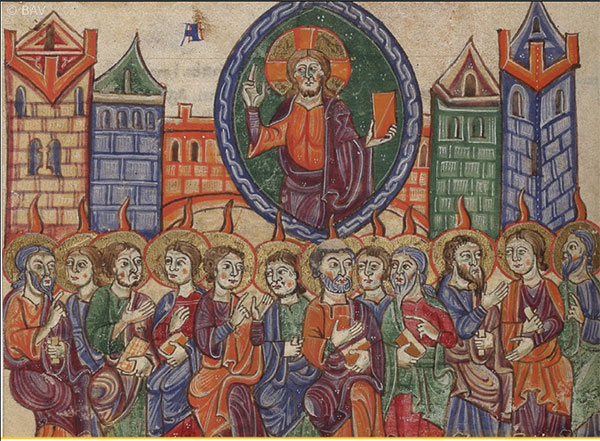
Pentecost, Possession, and Sacred Language
COMMENT | Gertrude Kamya Othieno | Pentecost marks the descent of the Holy Spirit upon the disciples, fifty days after the resurrection and ten days after the Ascension. According to Acts 2, the Spirit arrives with the sound of a rushing wind and tongues of fire, and suddenly the disciples begin to speak in other languages. People from different nations gathered in Jerusalem, each hearing them in their own mother tongue. It is a profound moment of divine empowerment, signaling the beginning of the Church’s mission in the world.
Traditionally, Pentecost has been understood as the fulfillment of Christ’s promise that his physical departure would usher in the age of the Spirit. But what makes this moment especially powerful is how the divine is manifested through language. It is not silent. It speaks. And it speaks to everyone.
In many African traditional belief systems, the idea of the spirit speaking through people is not unusual. It is, in fact, central to how sacred knowledge is revealed. Spirit mediums, prophets, or elders, often in altered states or ritual settings, speak in tongues, trance utterances, or ancestral voices. This is not dismissed as irrational; it is revered as a form of divine communication. It is how the community knows that the spirit is present.
Among the Balanta of Guinea-Bissau, spirit mediums during final funeral rites may begin to speak in unfamiliar tongues, believed to be messages from the departed or ancestral spirits. Similarly, during okwaabya olumbe in Buganda, individuals may enter trance-like states where speech shifts, language transforms, and sacred truths are revealed. These utterances may be emotional, rhythmic, or incomprehensible, but they are not ignored. The community listens. Interpretation follows. The sacred is understood as speaking through the human vessel.
Pentecost, then, is not merely a Christian anomaly. It reflects a broader spiritual reality found across African traditions that when the spirit comes, it does not whisper; it inhabits. And language becomes the site of encounter.
What’s more, the emphasis on hearing each in their own language speaks volumes. The Spirit does not demand uniformity. It honours difference. Pentecost is not about enforcing one sacred dialect; it is about revealing unity through diversity. Each person hears the sacred message not in the elite tongue but in their own familiar speech.
African orality, songs, chants, drumming, and praise have long celebrated this principle. The sacred is not found in written scripture alone, but in living language, shared communally. To speak and be understood in one’s own tongue is to be seen, valued, and known by the divine.
But Pentecost is also a moment of commissioning. The Spirit does not descend to entertain – it descends to empower. The disciples are no longer just followers. They become leaders, proclaimers, and witnesses. Similarly, in African traditions, when the spirit comes upon someone, it is not for status; it is for responsibility. They must act, teach, warn, heal, or guide. With power comes burden.
Pentecost reminds us that the journey does not end in silence or stasis. The Spirit continues to move across lands, languages, and legacies. Whether in an upper room in Jerusalem or a sacred grove in Africa, when the Spirit speaks, it transforms.
The question is not whether it has spoken. It is whether we are still listening.
****
 Gertrude Kamya Othieno | Political Sociologist in Social Development (Alumna – London School of Economics/Political Science – LSE) | Affiliated to Global People’s Network (GPN) – A Socio-Cultural Movement | Email – gkothieno@gmail.com
Gertrude Kamya Othieno | Political Sociologist in Social Development (Alumna – London School of Economics/Political Science – LSE) | Affiliated to Global People’s Network (GPN) – A Socio-Cultural Movement | Email – gkothieno@gmail.com
AFRICA’S STRENGTH IS KNOWLEDGE
 The Independent Uganda: You get the Truth we Pay the Price
The Independent Uganda: You get the Truth we Pay the Price



